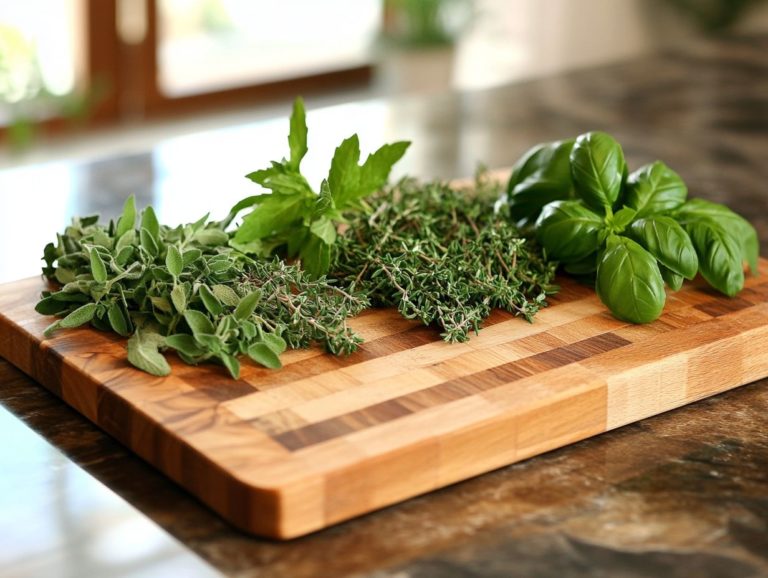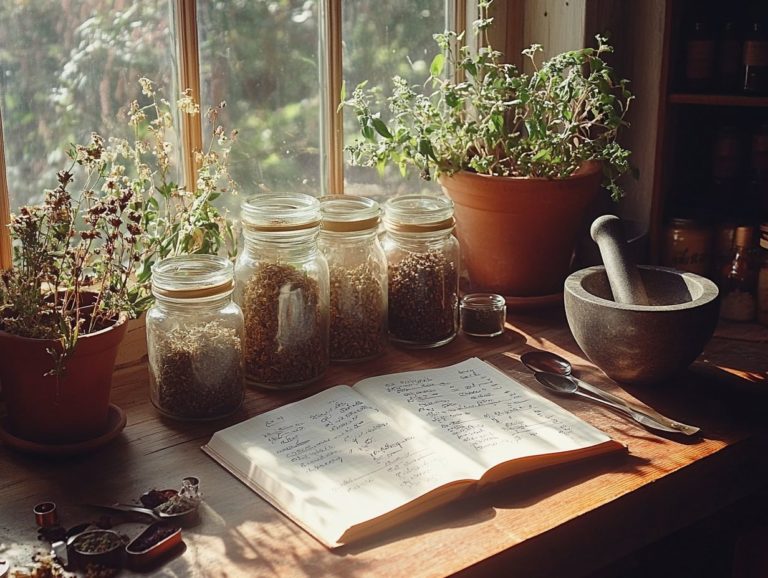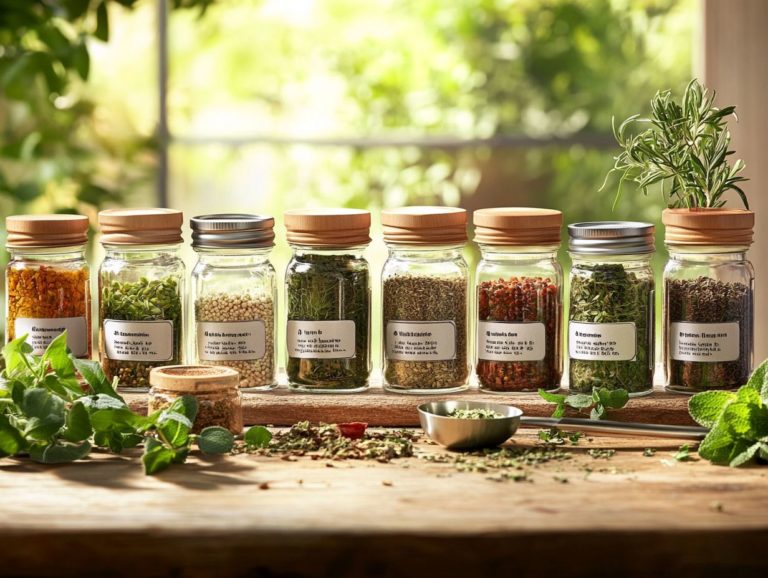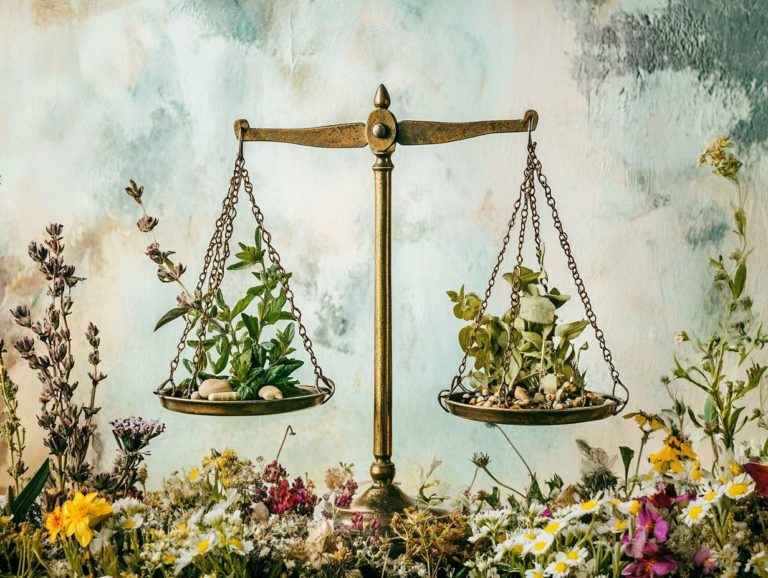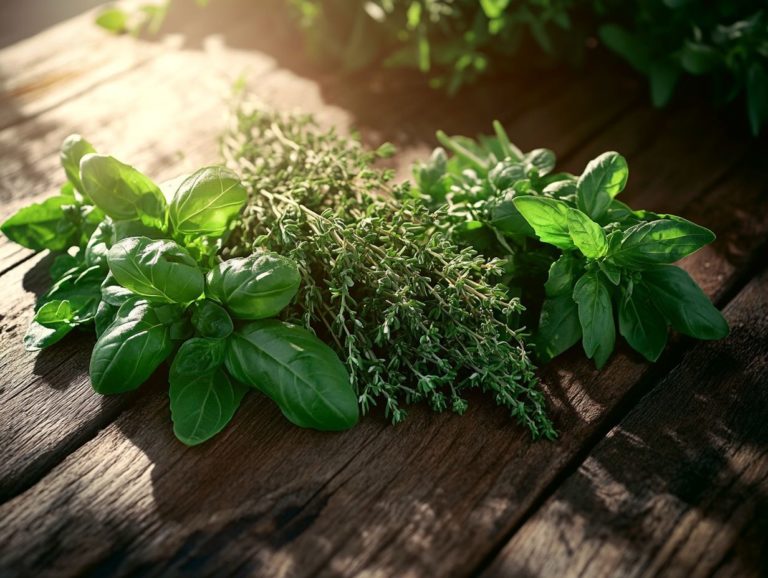Herbal Dosage for Children: Safe Practices
Navigating the realm of herbal remedies for children can be both thrilling and intimidating for you as a parent.
Understanding the unique aspects of herbal dosage for kids is essential. Their bodies respond differently than those of adults, which requires you to keep their safety in mind. This article delves into the reasons behind the variations in children s herbal dosages, the crucial factors to consider, and the safe practices for administering herbs.
It highlights commonly used herbs, detailing their benefits and potential risks. By the conclusion, you ll feel empowered to make informed choices about herbal remedies for your little ones.
Contents
- Key Takeaways:
- Understanding Herbal Dosage for Children
- Factors to Consider Before Giving Herbs to Children
- Safe Practices for Administering Herbal Dosage to Children
- Commonly Used Herbs for Children
- Potential Risks and Side Effects
- Frequently Asked Questions
- What is herbal dosage for children and why is it important to practice safe methods?
- What are some safe practices to follow when giving herbal medicine to children?
- How do I determine the proper herbal dosage for my child?
- Are there any potential risks associated with giving herbal medicine to children?
- Can I give my child the same herbal dosage as an adult?
- What should I do if my child experiences any adverse reactions to herbal medicine?
Key Takeaways:
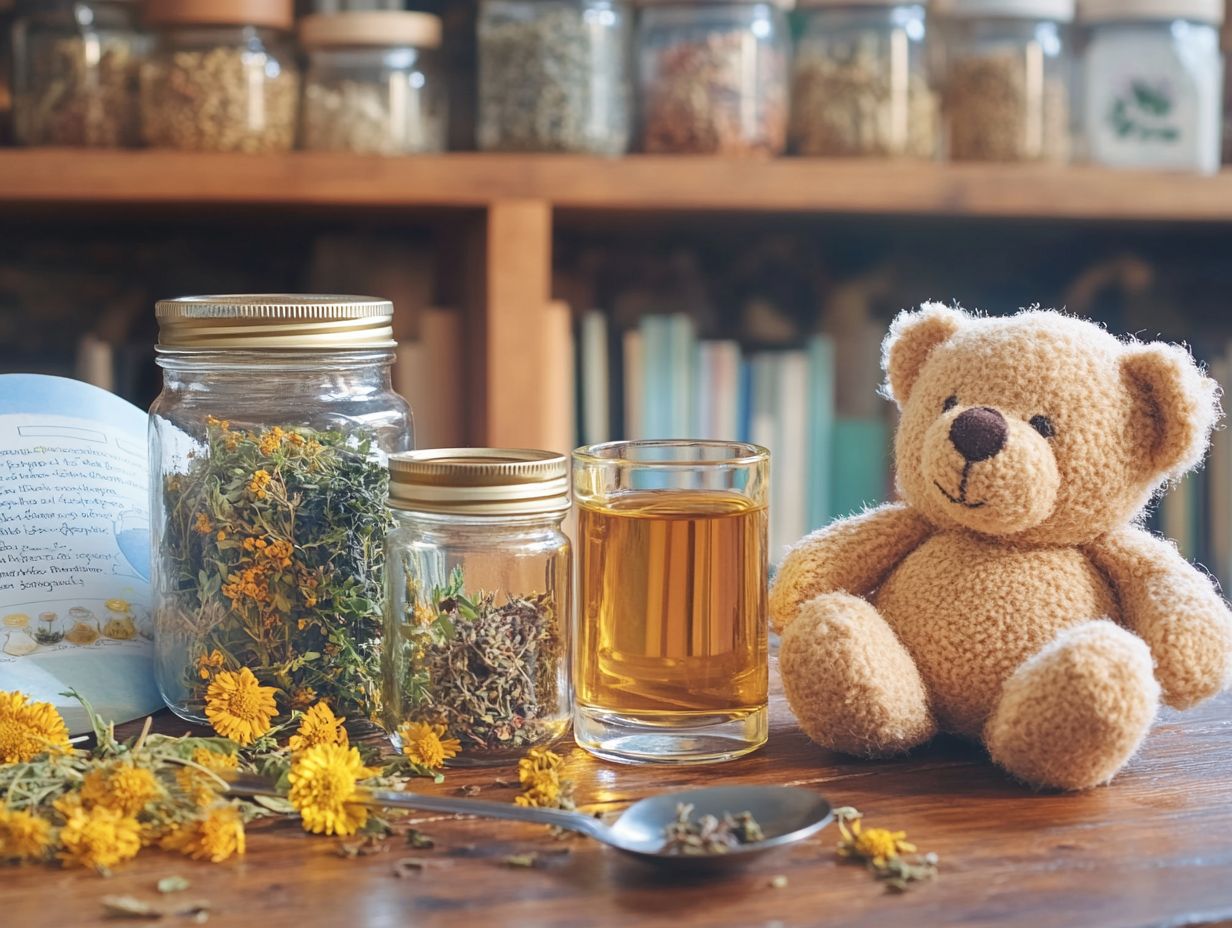
- Always consult with a healthcare professional before giving herbs to children, as their dosage may differ from adults due to age, weight, and existing health conditions.
- Proper measuring techniques are crucial in administering herbal dosage to children, as inaccurate dosages can lead to potential risks and side effects.
- Some commonly used herbs for children include ginger, chamomile, and echinacea; it is important to understand their benefits and follow recommended dosages to avoid adverse reactions.
Understanding Herbal Dosage for Children
Understanding herbal dosage for children is essential because their bodies metabolize herbal remedies differently than adults do. You need a tailored approach to keep your child safe and ensure efficacy.
Unlike conventional pharmaceutical drugs, herbal medicine offers a wealth of natural remedies, including liquid extracts from herbs and teas crafted from medicinal plants. Whether addressing chronic or acute conditions, it s vital to consider factors such as age, weight, and existing health issues when following guidelines for herbal treatments.
This way, parents and caregivers can navigate the world of herbalism with confidence while prioritizing the well-being of their children.
Why Herbal Dosage is Different for Children
Herbal dosage for children differs from that of adults primarily due to variations in body composition, metabolic rates, and sensitivity to side effects.
These physiological distinctions require a careful examination of how medicines work when determining suitable herbal treatments for younger individuals. For instance, a child’s smaller body size means that even a slight overdose of a certain herb can result in significant effects, making precise dosing absolutely essential. Incorporating 5 herbal tea recipes for kids can also be a beneficial approach to ensure safety and health.
While herbs like chamomile and ginger may provide soothing benefits for digestion and anxiety, others, such as elderberry, can lead to adverse reactions if not dosed correctly. Parents and caregivers must consult healthcare professionals to navigate these complexities, ensuring that herbal use is both safe and effective. For those interested in making their own remedies, it’s important to follow safety tips for creating herbal remedies tailored to the unique needs of children.
Factors to Consider Before Giving Herbs to Children
When contemplating giving herbs to children, several essential factors warrant your careful evaluation to guarantee their health and safety.
Consider aspects such as age, weight, and any existing health conditions that may influence their response to herbal remedies.
Age and Weight Considerations
Age and weight are pivotal factors in determining the right herbal dosage for children, as these aspects profoundly influence how their bodies metabolize medicinal herbs.
When calculating herbal dosages, you must consider these elements meticulously since children process substances differently compared to adults.
For example, a common guideline suggests that dosages for children can be calculated based on their weight typically around 1.5 to 2 mg of a specific herb for each kilogram of body weight.
Take chamomile, known for its soothing properties; you might offer 1 to 3 cups of tea daily for children aged 2 to 6 years. For older children, those aged 7 to 12, an increase to 3 to 4 cups may be appropriate.
Always keep in mind that individual responses to herbs can vary significantly, making personalized assessments absolutely essential.
Existing Health Conditions
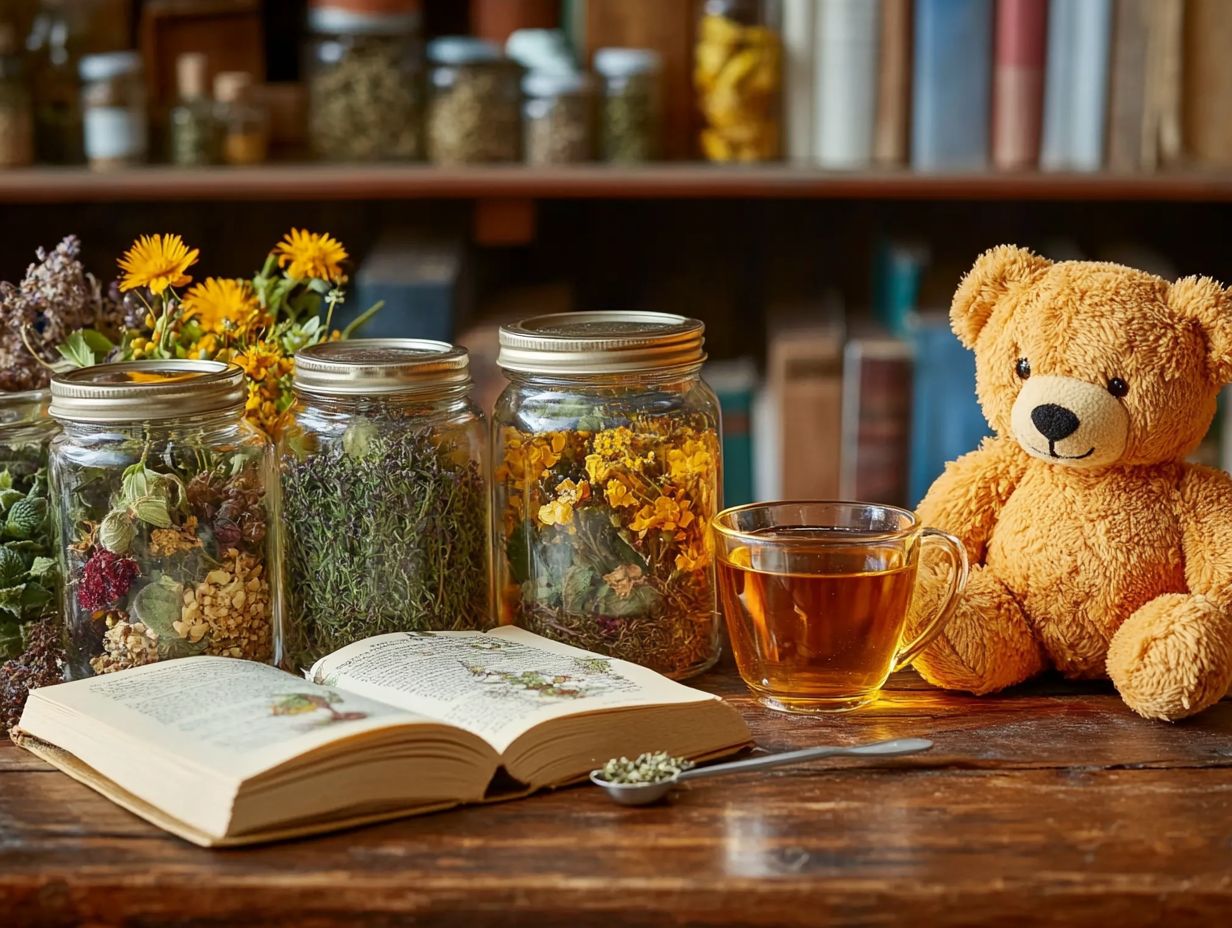
Before you consider administering herbal treatments to children, it s vital to take into account any existing health conditions that could impact their safety and how they respond to these remedies.
Allergies may cause adverse reactions. Chronic conditions can change how the body processes natural substances.
Some herbs could even worsen symptoms or negatively interact with medications prescribed for specific ailments. As a caregiver, it s essential to be fully informed about any diagnosed issues and how they might affect the effectiveness of the chosen herbal treatment.
Consulting healthcare professionals can offer personalized guidance to ensure you select the most suitable and safe herbal options tailored to your child s unique health situation.
Safe Practices for Administering Herbal Dosage to Children
Implementing safe practices for administering herbal dosages to children is essential. This approach ensures you can offer natural remedies confidently, without jeopardizing their health.
Consulting with a Healthcare Professional
Consulting with a healthcare professional before starting any herbal treatment for children is absolutely essential for safety and effectiveness.
These experts assess each child s unique health needs and circumstances. They can identify potential interactions between herbal remedies and any existing medications or conditions.
This professional oversight helps customize appropriate treatments. It also significantly reduces the risks associated with unsupervised herbal use. Healthcare professionals provide invaluable guidance on suitable dosages and possible side effects, ensuring you re well-informed every step of the way.
Their expertise is crucial for promoting holistic health in children while effectively safeguarding against potential complications.
Proper Measuring Techniques
Proper measuring techniques are vital when administering herbal dosages to children. Inaccuracies can lead to either ineffective treatments or unsafe dosing.
Ensuring that each dose is precise maximizes the health benefits of these preparations and minimizes the risk of adverse reactions. Using tools like graduated droppers for tinctures or measuring cups for herbal teas can help achieve consistent and accurate measurements.
Caregivers must understand that herb potency varies widely, so precise dosing is crucial for safety!
By utilizing measurement tools and emphasizing the importance of following guidelines, you can effectively support your child s health and well-being through herbal solutions.
Commonly Used Herbs for Children
Several widely used herbs are regarded as safe and beneficial for children. Each herb possesses unique properties and specific dosage recommendations tailored to their developmental needs.
Benefits and Dosage Recommendations
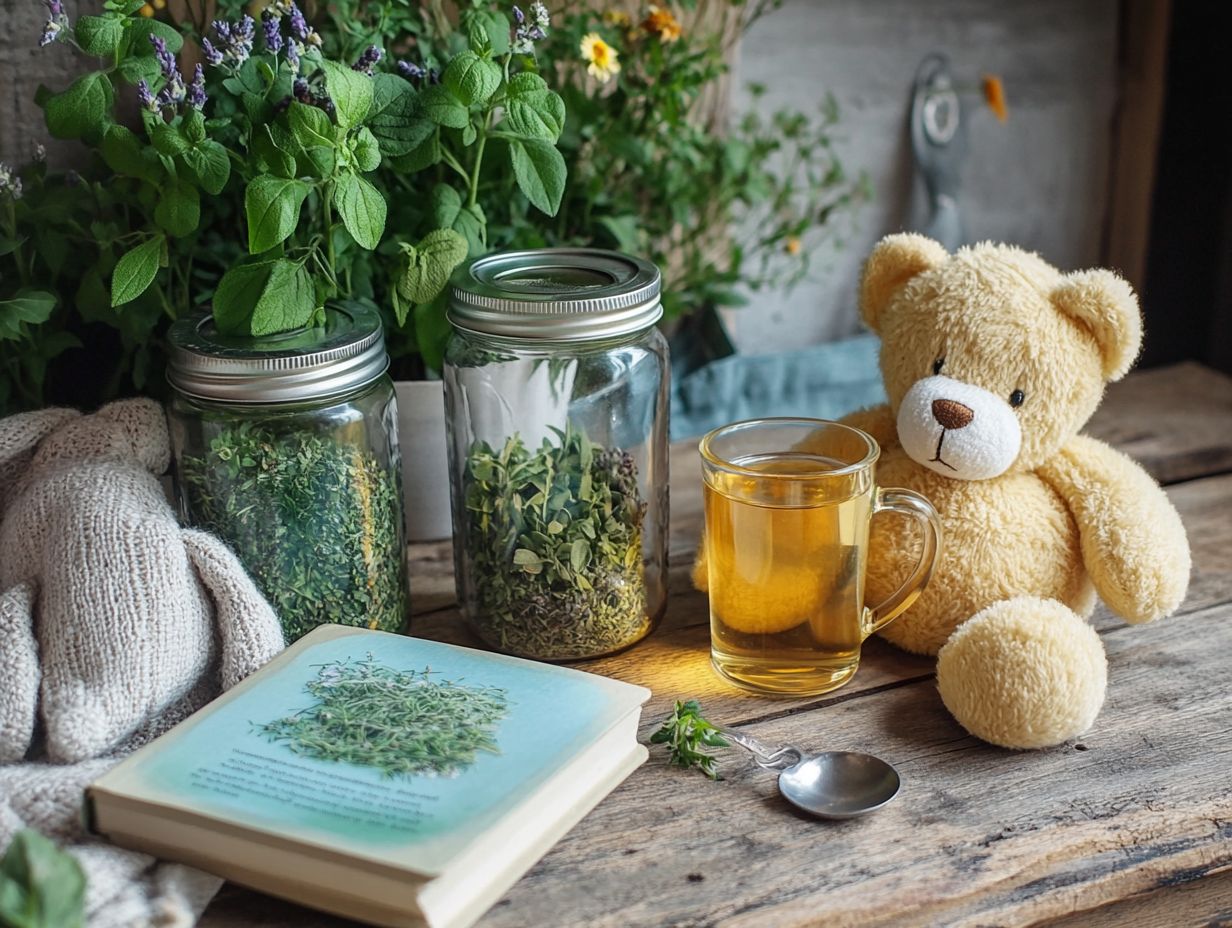
When exploring herbal treatments for children, it s essential to understand the benefits and dosage recommendations of specific herbs to ensure safe usage. This knowledge allows you to make informed decisions that enhance your child s well-being while guaranteeing that the remedies are age-appropriate.
Chamomile is popular for its soothing effects. It helps ease tummy troubles in children. For toddlers, a safe dose is usually 1/2 to 1 teaspoon of chamomile tea.
Then there’s elderberry syrup, which is popular for its immune-boosting benefits an excellent choice during cold and flu season. Recommended dosages vary with age; older children might benefit from 1 tablespoon, but it s crucial to monitor their reactions closely.
By thoughtfully incorporating these herbal options, you can foster a holistic approach to health, blending traditional practices with modern wellness strategies.
Potential Risks and Side Effects
While herbal treatments can offer a wealth of benefits, it s crucial to carefully consider the potential risks and side effects before administering them to children.
Identifying and Addressing Adverse Reactions
Identifying and addressing adverse reactions to herbal treatments in children is essential for their safety and well-being.
As a parent, be alert for signs that indicate a negative response to these treatments. These can include unusual rashes, swelling, stomach issues, or changes in behavior.
Paying close attention to these symptoms is critical, as they can range from mild to severe.
Act quickly! If you see troubling signs, consult a healthcare professional right away.
Prompt medical attention can significantly mitigate risks, ensuring that any adverse reactions are managed efficiently and safely. Staying informed and vigilant is your best strategy to protect your child’s health while navigating the world of herbal treatments.
Frequently Asked Questions
What is herbal dosage for children and why is it important to practice safe methods?
Herbal dosage for children refers to the recommended amount of herbal medicine that should be given to them. Practicing safe methods is crucial to ensure that the child receives the right amount of medicine and to prevent any potential side effects or adverse reactions.
What are some safe practices to follow when giving herbal medicine to children?
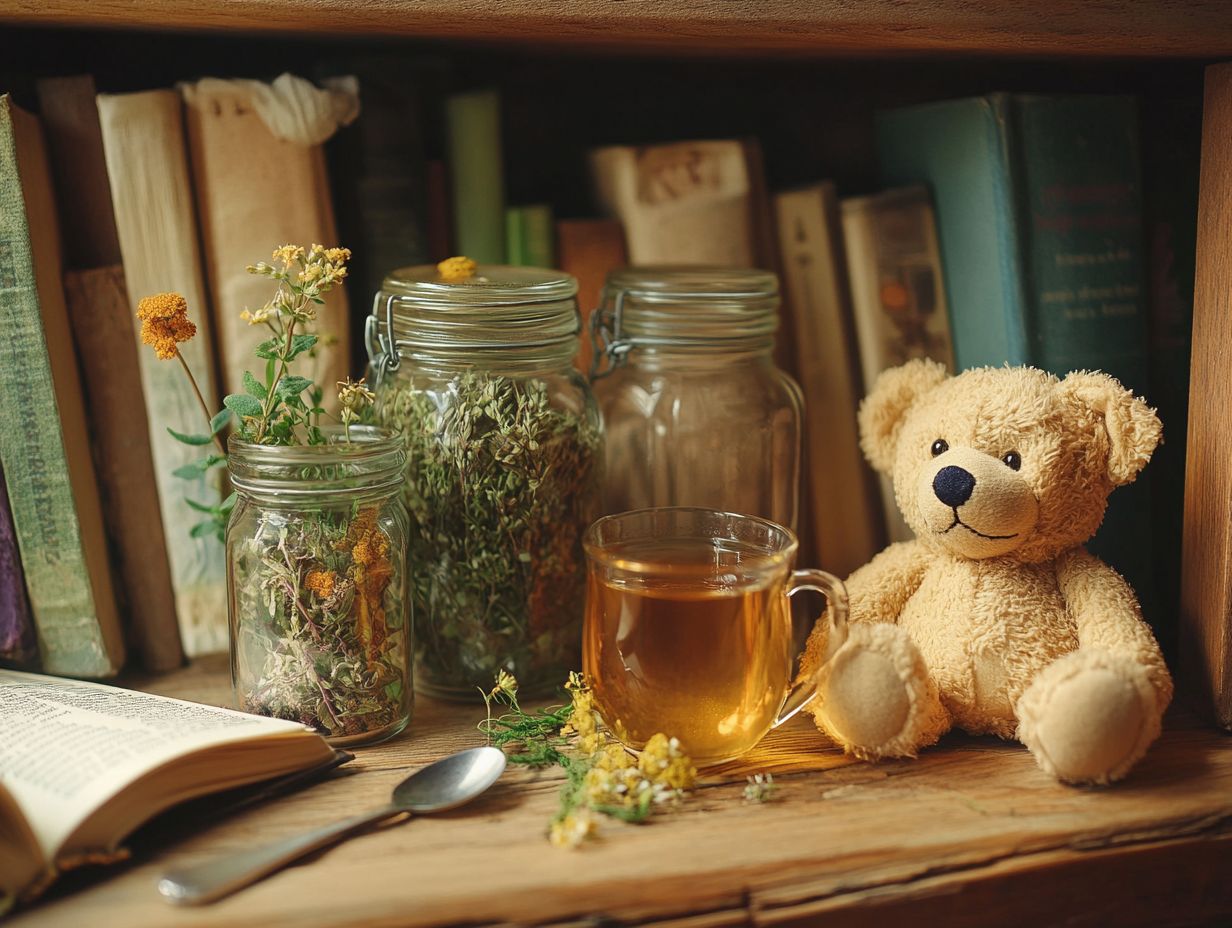
Some safe practices to follow when giving herbal medicine to children include consulting with a healthcare professional, following dosing guidelines, selecting high-quality and reputable herbal preparations, and monitoring for any potential side effects.
How do I determine the proper herbal dosage for my child?
The proper herbal dosage for a child depends on various factors such as age, weight, and the specific herb being used. It is important to consult with a herbalist or healthcare professional for personalized dosage recommendations for your child.
Are there any potential risks associated with giving herbal medicine to children?
Yes, there are potential risks associated with giving herbal medicine to children, just like with any other medication. Some medicinal plants may interact with other medications or have potential side effects. Always consult with a healthcare professional and follow safe practices when administering herbal solutions to children.
Can I give my child the same herbal dosage as an adult?
No, children have different dosing requirements than adults and should not be given the same herbal dosage. Their bodies are still developing and may react differently to herbal medicine. Always follow the recommended herbal dosage for children and consult with a healthcare professional for personalized recommendations.
What should I do if my child experiences any adverse reactions to herbal medicine?
If your child experiences any adverse reactions to herbal medicine, stop giving it to them immediately and consult a healthcare professional. It’s vital to monitor your child’s reaction to herbal preparations and seek medical advice if needed.

